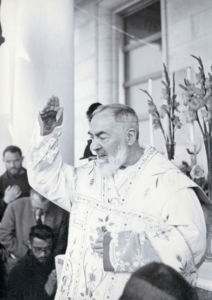Padre Pio was deeply devoted to Our Lady of Pompei, to whom he referred as “my very dear Mother”. From his earliest years he cherished a tender filial love for her and went on many occasions to her Shrine near the ruined city of Pompei.

While obliged to serve in the army as a young friar, he availed of every opportunity to run down to Pompei from Naples where he was stationed, to “say a few words” to his beloved Madonna. When he was released from the army for six months convalescence in 1917, we find him making the trip again to Pompei to thank Our Blessed Lady for this grace. During those years he was tireless in his prayers to the Virgin of Pompei, in novena after novena, to obtain the grace of returning to conventual life when he was obliged by delicate health to remain in his own home. He also prayed to her for the further grace of what he calls his “speedy departure”, by which he means his death. He appealed to his directors and to others bound to him by spiritual ties to recite these novenas to Our Lady of Pompei for his intentions. It was to the Virgin Mother of Pompei that he also directed his fervent prayers to be exonerated from military service, which for him was physical and spiritual torture. Our Lady obtained for him the grace to return to his community and to be discharged from the army, but the further grace of “speedy departure” was deferred for half a century. Even then, when he realized he was dying, it was to Our Lady of Pompei that he turned to thank her from the depths of his heart.
A touching incident concerning his devotion to Our Lady under this title is told of his last days. Only three days before his pious passing, on the eve of the 50th anniversary of his stigmatization, he was offered a bunch of roses. At once he took a rose and handed it to one of his spiritual sons, asking him to bring it to Pompei and place it before the image of Our Lady there.
Credit Foto Voce di Padre Pio © all rights reserved

